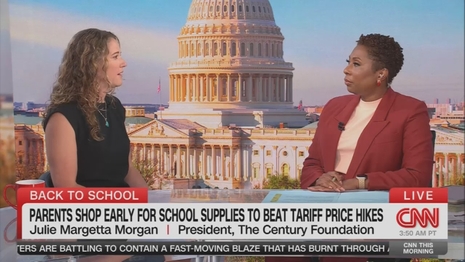 Be afraid. Be very afraid. Prices on back-to-school supplies are going to spike. And it’s the fault of Trump’s tariffs!
Be afraid. Be very afraid. Prices on back-to-school supplies are going to spike. And it’s the fault of Trump’s tariffs!
That was the not-so-subliminal message from a CNN This Morning segment today. And who better to help Audie Cornish make the case against Trump than Julie Margetta Morgan, president of the Century Foundation, a self-described “progressive” think tank. Morgan came to Century from Elizabeth Warren’s brainchild, the “Consumer Financial Protection Bureau.” You get the picture.
At one point, Cornish teed up Morgan, asking if parents will have to resort to buy-now-pay-later plans like Klarna to pay for “pencils and crayons.”
Morgan ran with that, warning, “We ought to be very worried.”
“Let’s see, ma’am. You want six No. 2s and a box of Crayolas. That’ll be 75 cents a month for 24 months.”
Painting a very grim picture of the overall economy, Morgan said that a poll by her Century Foundation found “one in four families saying that they’ve skipped meals to pay their bills.”
“Hey Johnny: what’s it gonna be: that pack of glue sticks, or supper?”
Could the Century Foundation be running afoul of anti-discrimination laws? Its “Diversity and Inclusion” page includes this [emphasis added]:
“At TCF, we stand for equity and justice for all and believe that diversity is a strength. We are committed to building a more diverse and inclusive organization. To that end, we invite our staff to voluntarily share demographic information so that we can hold ourselves accountable to our shared diversity, equity, inclusion, and accessibility goals.”
Pity the poor staffer feeling pressured to accept the “invite,” and “voluntarily” confess to being a straight, white, able-bodied male!
Note: Morgan did briefly acknowledge that prices are also affected by the inflation of recent years. But the segment’s focus was entirely on the Trump tariffs.
Here’s the transcript.
CNN This Morning
8/7/25
6:48 am EDTAUDIE CORNISH: And as parents are doing the math to get their kids’ school supply list filled, President Trump’s tariffs are going to be hitting stores. Two-thirds of back-to-school shoppers say they went shopping before mid-July this year. That’s up 12 points from last year. And more than half say they got an early start to get ahead of tariff-induced price hikes.
WOMAN SHOPPER IN BIG BOX STORE: The tariffs are definitely a little scary. We’re trying to get ahead of time because we don’t know what’s going to happen.
. . .
JULIE MARGETTA MORGAN: The Century Foundation did a poll recently where we found that families are really just trying to get by. We have one in four families saying that they’ve skipped meals to pay their bills. We’ve got about 40 percent of families saying that they’re dipping into savings or that they’re using credit cards or other debt to pay their bills. So people are really just trying to make it today.
. . .
This is the struggle for every mom or dad over the summer. You’re trying to take a look at your supplies. Do you have the sneakers? Do you have the t-shirts? Do you have the shorts?
CORNISH: And with some schools, pencils and paper, like, you’re buying supplies for the classroom.
MORGAN: And as you know, those supplies disappear throughout the year, right? So families are trying their best to get ahead of it. But I think we all know there are going to be sneakers that need to be bought in August and November and maybe in January.
And, you know, the best we can tell with the effects of these tariffs is that those prices are going to continue to rise over time.
. . .
CORNISH: Yes. What are you going to be looking for? I mean, are people going to, like, Klarna and, you know, short-term pay their pencils and crayons? What am I looking at?
MORGAN: I think we ought to be really worried about that. We’re already seeing the use of buy now, pay later and groceries, to pay for basics like groceries. So I think we really should be watching how this affects families’ budgets and how much of that ends up on debt.















